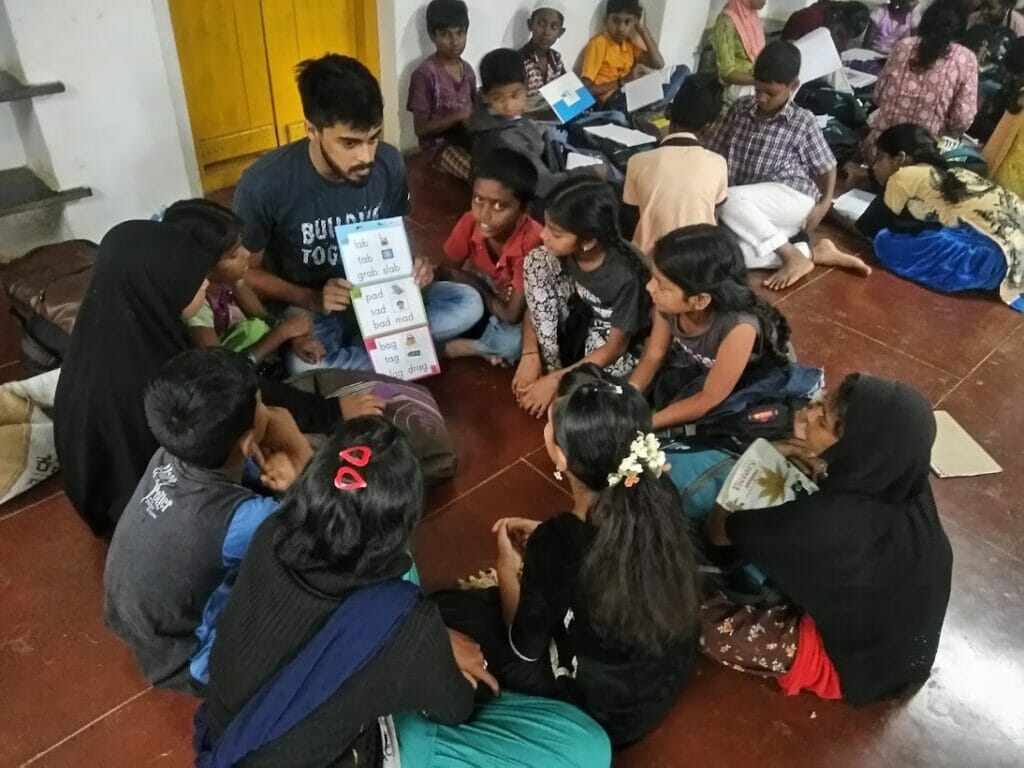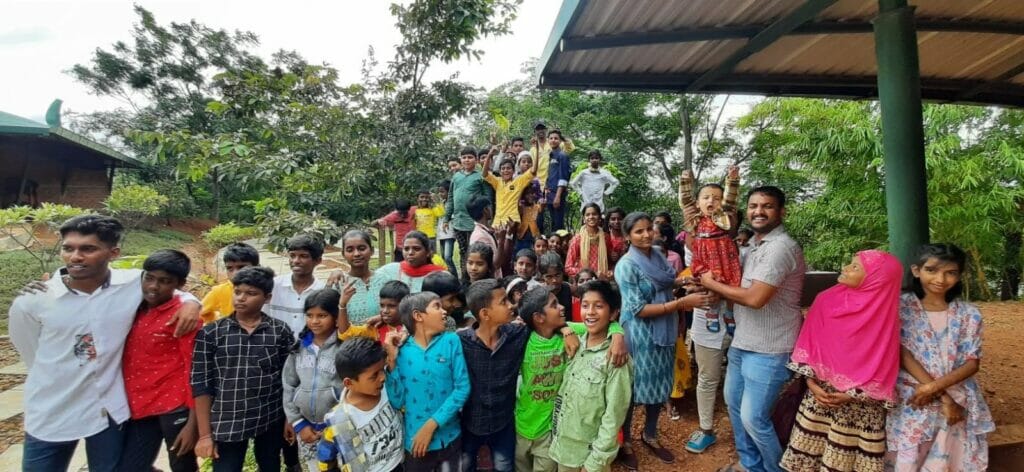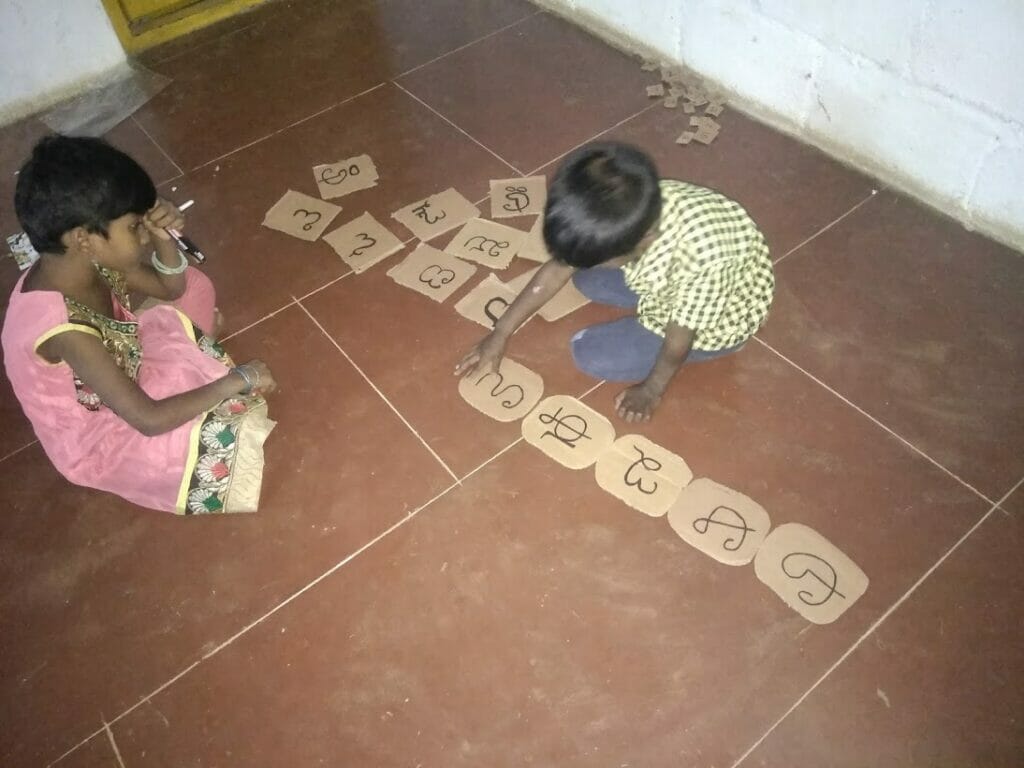Amidst books and puzzles, children from grades 3 to 11 and 12, mill around Vismaya Kalike, a community learning centre in Anjanapura. They organise themselves into groups, with a volunteer in tow, depending on what they want to learn about for the day.
Vismaya Kalike, an after-school support initiative, which stresses community-based learning, enables a democratic, inclusive and enriching learning space for them. Children come from all nearby areas, majority of them are from a settlement in Anjanapura.
Organisations that promote community-based learning have emerged as an important link in ensuring that children, especially those on the socio-economic margins, receive due attention and encouragement in pursuing their studies. As per reports, these models have been able to bridge the last mile when it comes to education, especially among children from “denotified tribes, orphaned children, migrant workers, and families from below the poverty line.”
Vismaya Kalike’s centre was started along similar lines. “We started this for first-generation learners in 2018 and have been running it since. After receiving an overwhelming response from the community, we realised the need for this,” says Vignesh Prasad, coordinator and Founder at Vismaya.
But why are these centres important today?
Filling the gaps
It is important to understand the gaps in the current infrastructure for education that have paved the way for these alternative forms of learning. “In a school, there is a lack of individual attention. We teach a class, we don’t know what each child’s bandwidth is. But in this particular space, we know accurately where the child lags behind,” says Janaki Prasad, who has been a teacher for 30 years, and is currently engaged with the children at the centre for three years now.

It works differently with each child, she says, adding that she uses incentives, tamarind seeds, etc while explaining mathematical concepts like division to a child. In her previous job as a teacher, the format was bound to the syllabus. “Here, I am only looking at the child learning a concept, which is a big difference,” she claims, adding that she has the space to experiment with different and more effective teaching modes. Through participatory learning, the centre has made mathematical concepts easy to understand for the children.
“We also realised the children don’t know the basics even, they’re just going along with the motions of school,” says Vignesh, adding that their schools don’t have the bandwidth to actually help them catch up with the basics. Further, they also realised children primarily need a safe space. “Initially, our focus was to create something akin to an organised play space, where they could play the sports that their upper-middle-class counterparts would in their apartment complexes. As schoolwork was crucial, they slowly started introducing science experiments and other things,” he says.
Read more: Learning to learn: a teen’s homeschooling experience
Previously, Citizen Matters reported on how government schools were facing an uptick in dropout rates, as parents either found it unaffordable to fund their children’s education, or the children werebeing entrusted with sibling care at home, etc. The number was higher for those enrolled in primary and upper primary levels, which are considered crucial learning years.
What happens to these children who fall through the cracks?
Students from diverse backgrounds
“We have students coming from several underserved communities, they don’t enjoy at home or at school,” says Gurumurthy. M, a trustee at Vismaya Kalike. Their centre in Anjanapura, hosts children largely from the Muslim community, children of pourakarmikas and domestic workers studying in government as well as private schools.
While socio-economic determinants might be responsible for the aforementioned lag in learning, it is also impacted by reasons like migration, language barrier or just lack of support. “We have had students in eighth grade come to us not knowing addition or to read a small paragraph. So alongside helping them with their grade-appropriate algebra homework, the coordinators also taught them the basics across subjects,” says Gurumurthy.
The centre witnessed around 60 students coming in everyday and there is a footfall of over 200 children participating in the centre.

“During COVID-19, we would check in with them telephonically and send them resources. Not every child has a smartphone in their homes, so we distributed xeroxed copies of worksheets and stories, and prompted them to share among themselves within their vicinity,” says Venkatesh Naik, community facilitator. He recollects how older students in the centre rose to the occasion to ensure each child was brought into the fold.
Read more: Preschools reopen, but parents are still hesitant
Format of learning
According to Vignesh, learning doesn’t happen in classrooms, the children come in, have an hour of playtime and then organise themselves based on what they want to learn or the doubts they need clarified. The children are also amidst volunteers who nudge them to ask questions or reflect on their time here at Vismaya. “Some days are also days when they just need time off, we are trusting them to be able to make that call, then letting them decide for themselves, what they want to do,” Venkatesh states.
With the added lack of exam pressure, “they learn at their own pace out of their interest, and this stays for a longer time,” says Janaki. No child is forced to learn at a specific time or a specific subject. They do not take attendance.
“We want the children to take ownership of their learning right from the get-go, when they want to study, when they want to play. We instil in them that they have to take responsibility for their own learning,” says Vignesh. He says they try to gamify the learning experience and steer away from rote learning.
Additionally, Venkatesh says, they also use karaoke and rhyme sequences to help children remember the said concepts. “Through participatory learning, we have made mathematical concepts like addition easier.”

“We see a lot of peer learning happening now where when some children have been there for three or four years. They take the new students under their wing and help them get settled,” says Vignesh, commenting on how this is promising as a long-term endeavour.
The coordinators say the centre affords them the space and agency to learn and grow at their own space. Centres that instigate community-based learning like Vismaya Kalike, are important to supplement the formal modes of education being provided through schools in the city.
Excellent work being done by Mr Vinesh Prasad and Mrs Janaki Prasad for the under privileged children in a most befitting manner that the present Education system requires. Learn while you play and stress free education with no set formats by which a child’s mind opens up for grasping all that’s around including the bookish knowledge seems to be the base and the pillars of Vismaya Kaliki’s vision. Kudos to Mr Vignesh, Mrs Janaki and their team for not only initiating but continuing with the same vigour and enthusiasm a noble act that deserves a selfless service. My salutes to them.
Congratulations to Mrs Janaki Prasad and Mr Vignesh Prasad on this effort. Working with underprivileged children and democratising learning is commendable. Getting across lags in learning through concepts that are community based, participative, inclusive and in an enriching working space sounds exciting and a I am sure very rewarding. Wish Vismaya Kalike all the best in the years to come. This is an idea whose time has come!
A great service. Kudos to the team of volunteers.
Commendable and excellent efforts by Smt Janaki and young Vignesh. Am reminded of the old saying saying it is better to teach a man to fish rather than giving alms. By this great initiative, they are enhancing the lives of the students but also their immediate family. Congratulations, and Best wishes for a great future of their initiative and efforts. God bless…
Excellent initiative to serve the Society and Mankind with well identified enriching concepts which is the present need of the hour specially for a holistic growth mentally and physically.
Freedom to learn at will without restrictions and compulsions is a Boon and is further propelled when equal opportunities is afforded to all the sections of the society .
Big Salute to Mrs Janaki Prasad & Vignesh for their dedication and commitment to this very noble cause . Kudos to the entire team for making this happen…
I am sanguine that the Vision,Goal and the Objectives set by the Vismaya Kaliki School of learning , will not only be highly successful , but also be a perfect media to impart meaningful education.